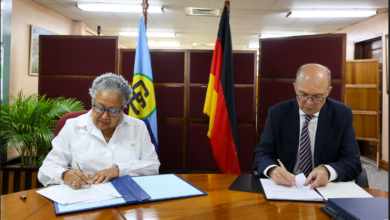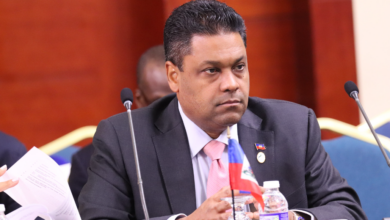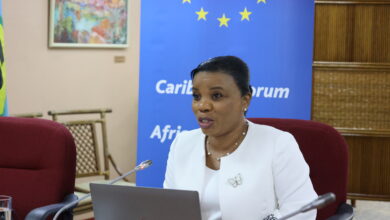Hon. Ministers,
Other Heads of Delegations,
Members of the Diplomatic Corps,
Heads of Regional Institutions,
Distinguished Guests,
Ladies and Gentlemen of the Media,
Staff of the Secretariat
I am pleased to extend a warm welcome to you this morning to this Opening Ceremony of the Eleventh Meeting of the Council for Trade and Economic Development of the Caribbean Community. A mere 24 hours ago, I had a similar experience at the Opening Ceremony of the Council for Foreign and Community Relations of the Caribbean Community. The Meeting of that Community Organ is still in progress. Let no one charge that our Community Ministers are not hard at work.
In this regard, this Council (COTED) has been the most active since the creation of the new Community Structure of Governance, meeting as it is today, for a record eleven times, and this already being its second for the year. Today’s Agenda, while encompassing issues of trade in goods, the industrial and services sector, gives pride of place to issues relating to the agriculture sector – one of the most vital in the development of a CARICOM Single Market and Economy.
Hon. Ministers, ladies and gentlemen, as we are all aware, the preparation of the economies of the Member States of this Community for eventual integration into the global economy remains one of our principal task of today. Economic developments internal to the Community and the changing international trade landscape influenced by a series of negotiating fora, continue to jostle for domination of the agenda of Regional governments. Today, we will continue to give consideration to a wide range of issues related to our efforts to carve out our niche within this global environment.
To that end, within CARICOM, the central focus is the establishment of the Single Market and Economy. The Community has taken a number of positive initiatives towards realising that goal in recent times, notable among them being the holding in Barbados in November last, of a Special Consultation involving all the sectors of civil society, on the implementation of the Single Market and Economy. That Consultation which was chaired by the Hon. Owen Arthur, Prime Minister of Barbados and CARICOM Head of Government with responsibility for the Single Market and Economy, sought to meet the main challenge to the Community of moving the Single Market and Economy from – in his words “a concept to a lived experience“.
The basic legal framework of the Single Market and Economy is virtually complete, thanks to the devotion and technical skills of our Inter-Governmental Task Force, ably chaired by Ambassador Barrow of Barbados, and technically supported by the indefatigable Legal Consultant, Mr. Duke Pollard – (And I must tell you a little story about this Instrument. When the Heads of Government established the Task Force a few years ago, yours truly was named to the Chair and Ambassador Barrow as my deputy. Increasingly, however, as meeting after meeting took place, and other demands on the Secretary-General made it impossible for me to attend, Ambassador Barrow took the Chair and performed the function so efficiently that quietly, smoothly, and without fuss, or anyone noticing, he simply became the Chairman, the Secretary-General became the former Chairman – all without even the need for a formal decision. Ambassador Barrow and the Legal Consultant and their team all deserve our deepest thanks and warmest congratulations.)
Now the primary focus of the CSME programme is to initiate implementation by Member States of their obligations under this Instrument, with emphasis on Trade in Goods and Services, Free Movement of Capital and Persons and the right of CARICOM nationals to establish business enterprises anywhere in the CSME. The key action in all OF this is the removal of current restrictions in all these areas and their non-replacement. In other words, the capacity to achieve a significant part of the task lies in our very own hands – remove the barriers vis-a-vis each other, many of which we indeed had constructed ourselves.
In the area of Trade in Goods, we continue to experience delays in the implementation of decisions relating to the phased reduction in the CET and in the removal of non-tariff barriers to trade. Thankfully, these are maintained by only a few Members on selected goods of Community Origin. But they can prove more than irksome to the exporter!
In services, the main thrust remains liberalisation. A study was recently undertaken setting out proposals for the removal of the restrictions in this sector. A Working Group established to deal with Services Negotiations met earlier this month to examine the Study and the recommendations for removal of restrictions and I have been advised that Member States are virtually ready to start negotiating their removal. We seem to be in the same mode in respect of the removal of restrictions on the movement of Capital and the exercise of the Right of Establishment. These are encouraging signals, but so far, only signals and believe me, the train is late.
Since January, we have convened a number of Meetings of the Organs of the Community that have resulted in consensus/agreement on a number of other issues specific to the advancement of the CSME. At the Tenth Meeting of the COTED, you will recall that Member States supported the creation of a Prime Ministerial Sub-Committee on the CSME which is to be serviced by an expanded and revised Single Market and Economy Unit within the Secretariat. A Technical Advisory Council, comprising representatives of Civil Society, especially the private sector, would now also be constituted to advise the Sub-Committee.
Major decisions were also made by the Twelfth Inter-Sessional Meeting of the Conference of Heads of Government regarding Free Movement of Skilled Persons, including, that Member States establish without delay, National Accreditation Bodies. That Meeting also agreed that the following issues are key to the Free Movement of Persons: clarification of rights of persons with respect to permanent residence including access to social services in another Member State; early resolution of the issue of definition of nationals; the development of criteria with respect to experience (as against qualification) for the agreed categories of persons; and explicit provision to be made for the free movement of all categories of persons eventually.
The Conference also took interest in the fact that some countries had not yet enacted legislation relating to the transfer of Social Security benefits and in recommendations that came before it, such as that for a study on the impact of free movement of labour and the establishment of Common Caribbean Technical and Vocational Education Qualifications.
In addition to the foregoing, the Seventh Meeting of the Community Council of Ministers and the Thirteenth Meeting of the Bureau of Heads of Government were also convened and advanced a number of these issues.
The successful functioning of the CSME hinges on the development of a number of key institutions at both Regional and National levels. Among these are the Caribbean Court of Justice (CCJ), the Caribbean Regional Organization for Standards and Quality (CROSQ) and the Community Competition Commission. We have been able to make steady progress on the CCJ – the Agreement signifying the intention to establish it having been signed by Heads of Government at the Twelfth Inter-Sessional Meeting in Barbados; and CROSQ, which is now in the process of being established in Barbados. Work will shortly begin on the Competition Commission.
From here on, the Legislative Agenda relating to the CSME is three-fold .One is the ratification of the revised Treaty and its enactment into municipal law. The second is the removal and amendment of legislation which are inconsistent with Member States’ obligations under the revised Treaty. The third is the practical task of harmonizing legislation including restrictive business practices, consumer protection, dumping and subsidies, banking and securities, intellectual property, customs, corporate taxation and as soon as we can agree internal taxes.
In today’s Agenda, in addition to our traditional trade issues, a number of new issues have arisen that require urgent Ministerial attention. To assist Ministers in their deliberations the Agenda has been divided into three main parts. First, we begin by looking at the Implementation of the Obligations of Member States under Protocol II, that is, removal of restrictions to Right of Establishment, Movement of Capital and Trade in Services. We will be leading off with the examination of the state of preparations to launch negotiations on the removal of a number of restrictions that prohibit or frustrate otherwise “free and fair trade” in this area
I am advised that some 350 different types of restrictions have been identified for removal. Regionally, our Services Sector has begun carving a space for itself; it is critical that we provide the enabling environment for it to prosper. The Council therefore be expected to give directions to the Working Group on Services Negotiations to complete its proposals for consideration by Member States and the joint Meeting of COTED/COFAP/COSHOD by September/October this year.
Secondly, Hon. Ministers, you will need to give consideration to a number of significant issues relating to Trade in Goods. The Council will have before it, the results of a Study to inform the development of Trade Policy for Agricultural Products which was presented preliminarily AT the Ninth Meeting of the COTED in Barbados last year. In this regard the Council will receive submissions from the “Working Group to Inform Changes in the CET for Agricultural Products in CARICOM” established by the Tenth Meeting of the COTED to advise the Council on the implications for the CET. We also RECEIVED submissions by selected Working Groups on Rice and Sugar. Also, the “Task Force to Examine Terms and Conditions under which Goods from Free Zones are Traded in a Single Market and Economy” has returned proposals for decisions. It is hoped that these will be found acceptable.
Finally, in this area of Trade in Goods we hope to secure clear policy decisions on a number of specific items of interest to individual Member States. We anticipate that concessions will be made on all sides and that Member States submitting their requests for policy changes will be satisfied with the decisions by the Council.
Thirdly, Hon. Ministers you will find issues relating to the development of a viable agricultural sector. The Region’s efforts to address the development of a viable agricultural sector is set within the context of the sector being an extremely complex one which contributes significantly to our respective economies in areas such as employment, food security, and foreign exchange earnings as well as inter-sectoral linkages such as with tourism and manufacturing.
The Council for Trade and Economic Development will have an opportunity to review the refocussed proposals for the Transformation Programme for Agriculture and progress on industry/competitiveness, analyses being undertaken to catalyse the sustained growth and development of industries identified for prior attention by Member States. Related to these issues, is the examination of the prospects and strategies for major commodities such as poultry, rice, sugar, fisheries as well as matters related to maintaining a strong agricultural health and food safety status within CARICOM, and the contribution of collaborating agencies in this regard.
Underlying all of this is the understanding that a viable agricultural sector is indispensable to the well being of our Caribbean Community.
Hon. Ministers, Ladies and Gentlemen, our officials have spent one full day considering these various issues and developing recommendations. My hope is that your task over the next two days will consequently be made simpler and more certain of success.
Finally, I believe that I can best conclude by calling for this Eleventh Meeting of the COTED to send a clear and definitive signal that all Member States are committed to implementing the measures necessary to ensure that the Single Market and Economy, including a viable agricultural sector, will become fully operational without delay.
I thank you.





